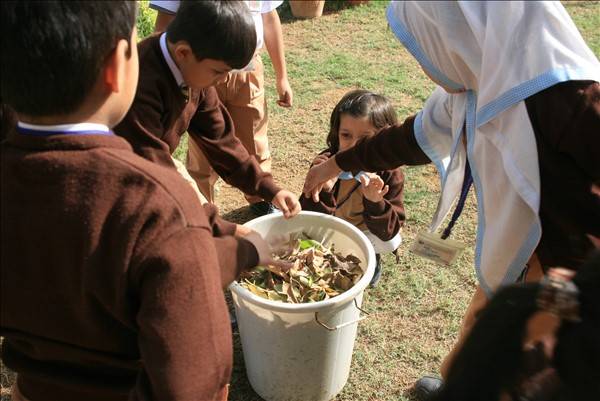
It’s that time of the year once again when I am getting ready to welcome a new batch of young gardeners in the Learning Gardens around the city. I feel nostalgic and blessed when I remember that it all started from an idea that I blogged about back in 2008. ‘’Every school must have a farm’’ was a dream that soon came true when a school invited me to run a pilot project a decade ago.
Each morning, young girls from grade 1 to 11 would leave their traditional classrooms to transform a barren plot within the school’s premises into an organic farm. The first two years were great fun – 1,500 girls and many teachers and other staff members all actively participated in the gardening classes. Today, after a decade, there are more than 5,000 children enrolled in regular Learning Garden classes around the city.
The initiative is called “Green Schools Pakistan” and the idea revolves around the concept of growing one’s own food organically, DIY green living, global citizenship and eco-literacy. The ‘Green Curriculum’ offers custom-made lesson plans for each grade that integrates well with the regular curriculum that a school follows.
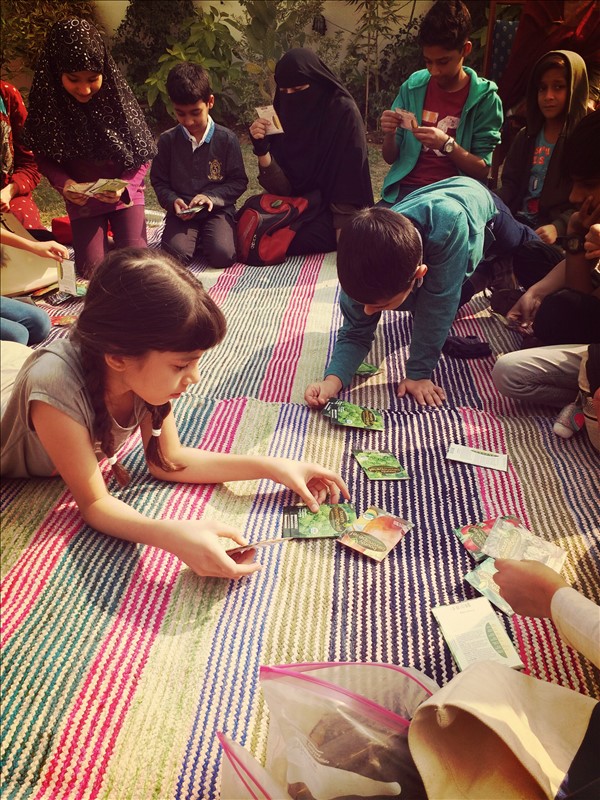
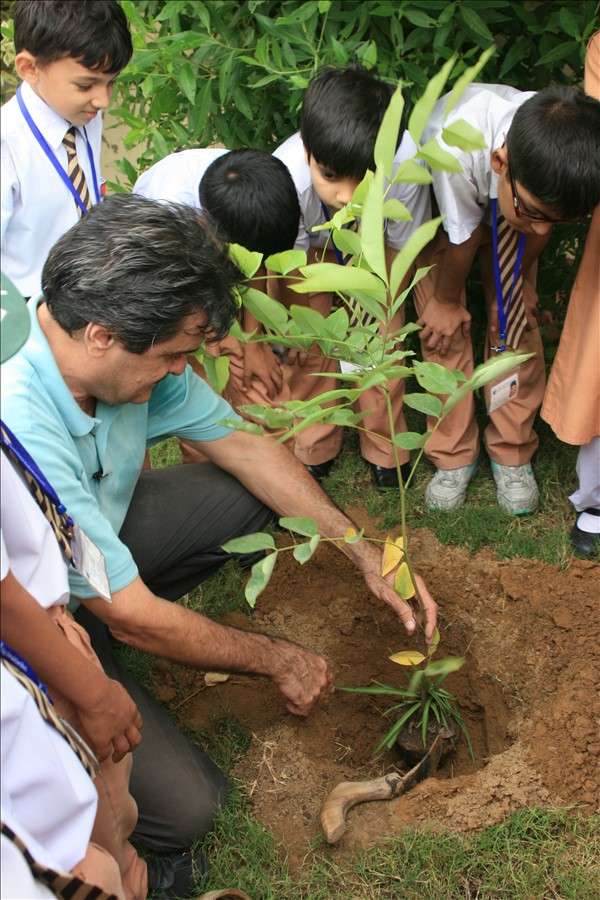
Learning Gardens and Beyond
When the session begins in August, children embark on a journey to discover how they are connected with the beautifully complex ecosystem and how they are amongst the participants of this diverse universe. They explore the food production cycle, the politics behind seeds and the importance of seed saving – as well as local environmental problems and their solutions. Composting, companion plantation, making fertilisers and practicing permaculture design practices makes the outdoor learning enlightening and memorable.
I try to invite students doing research on smart cities, green spaces and organic food production to share their discoveries with children at these schools. Start-ups with eco-solutions are introduced to inspire children to think of ways in which they can play a positive role in the world’s sustainable future.
The goal here is to think of ‘smart cities’ and train children to one day become residents of these.
“In the designing of smart and sustainable cities, a core area of focus is on enhancing the green space cover. Green spaces contribute to a more healthy city in a number of ways” says Farhan Anwer, who is an expert on urban sustainability planning, smart cities, public policy, climate adaptation, urban resilience, institutional strengthening and change management. “They act as carbon sinks and help in conditioning the atmosphere – a process that is particularly relevant in cases of extreme heat events. They serve as infiltration basins, thus reducing the harmful impact of urban flooding. In addition, if we also invest in edible gardens, then the benefits multiply even further – such spaces add to urban food security and also act as social spaces creating more community bonding. These days, edible gardens are being introduced extensively at the neighbourhood level and in schools around the world, as it is felt that if we connect children to nature, that is the best way to secure sustainable growth in the future.”
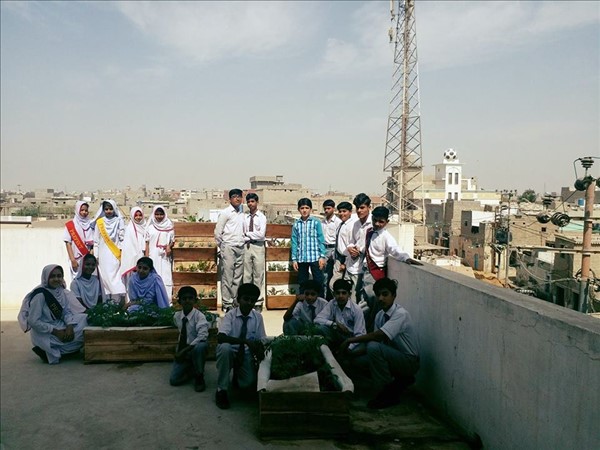
Be it a fenced garden in a playground in PECHS or a rooftop vertical garden in the middle of a slum in Korangi Industrial area, the ‘Learning Gardens’ are spreading all over the city. Most of the schools in Karachi are built inside bungalows or buildings that do not have garden spaces. Schools in densely populated neighbourhoods are usually a weak high-rise building or a construction which leaves no space for a garden.
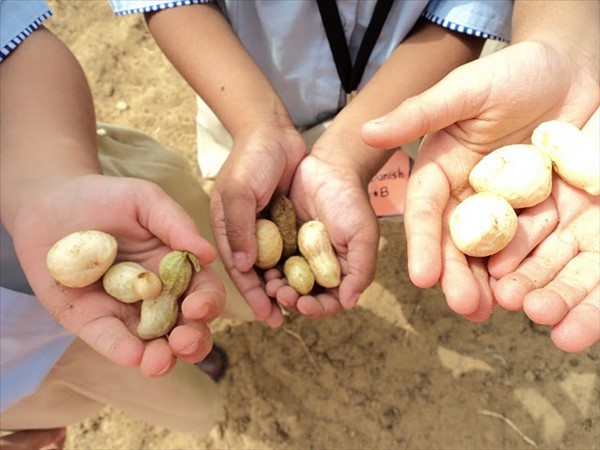
In these cases, container gardening becomes a perfect solution. Rooftops can host wooden planters to optimise the use of space. Three of my learning gardens with low space have vertical gardens made from wood on a terrace. Others have a combination of horizontal and vertical planters.
I am always fascinated to see children as they calm down their minds and hearts to make a bond with Nature. They begin to see themselves as a part of a diverse ecosystem and even an immense cosmos – and learn their impact on every little living thing that shares this planet with them. I believe this is the awareness that we need for a greener and better future. And I believe these children will be amongst the future leaders who will make that green imagination a reality.
Zahra Ali is a sustainability educator, writer and environmentalist. She blogs at cropsinpots.pk. Send in questions about gardening to Zahra@cropsinpots.pk
Each morning, young girls from grade 1 to 11 would leave their traditional classrooms to transform a barren plot within the school’s premises into an organic farm. The first two years were great fun – 1,500 girls and many teachers and other staff members all actively participated in the gardening classes. Today, after a decade, there are more than 5,000 children enrolled in regular Learning Garden classes around the city.
The initiative is called “Green Schools Pakistan” and the idea revolves around the concept of growing one’s own food organically, DIY green living, global citizenship and eco-literacy. The ‘Green Curriculum’ offers custom-made lesson plans for each grade that integrates well with the regular curriculum that a school follows.


Learning Gardens and Beyond
When the session begins in August, children embark on a journey to discover how they are connected with the beautifully complex ecosystem and how they are amongst the participants of this diverse universe. They explore the food production cycle, the politics behind seeds and the importance of seed saving – as well as local environmental problems and their solutions. Composting, companion plantation, making fertilisers and practicing permaculture design practices makes the outdoor learning enlightening and memorable.
I try to invite students doing research on smart cities, green spaces and organic food production to share their discoveries with children at these schools. Start-ups with eco-solutions are introduced to inspire children to think of ways in which they can play a positive role in the world’s sustainable future.
The goal here is to think of ‘smart cities’ and train children to one day become residents of these.
“In the designing of smart and sustainable cities, a core area of focus is on enhancing the green space cover. Green spaces contribute to a more healthy city in a number of ways” says Farhan Anwer, who is an expert on urban sustainability planning, smart cities, public policy, climate adaptation, urban resilience, institutional strengthening and change management. “They act as carbon sinks and help in conditioning the atmosphere – a process that is particularly relevant in cases of extreme heat events. They serve as infiltration basins, thus reducing the harmful impact of urban flooding. In addition, if we also invest in edible gardens, then the benefits multiply even further – such spaces add to urban food security and also act as social spaces creating more community bonding. These days, edible gardens are being introduced extensively at the neighbourhood level and in schools around the world, as it is felt that if we connect children to nature, that is the best way to secure sustainable growth in the future.”

Be it a fenced garden in a playground in PECHS or a rooftop vertical garden in the middle of a slum in Korangi Industrial area, the 'Learning Gardens' are spreading all over the city
Be it a fenced garden in a playground in PECHS or a rooftop vertical garden in the middle of a slum in Korangi Industrial area, the ‘Learning Gardens’ are spreading all over the city. Most of the schools in Karachi are built inside bungalows or buildings that do not have garden spaces. Schools in densely populated neighbourhoods are usually a weak high-rise building or a construction which leaves no space for a garden.

In these cases, container gardening becomes a perfect solution. Rooftops can host wooden planters to optimise the use of space. Three of my learning gardens with low space have vertical gardens made from wood on a terrace. Others have a combination of horizontal and vertical planters.
I am always fascinated to see children as they calm down their minds and hearts to make a bond with Nature. They begin to see themselves as a part of a diverse ecosystem and even an immense cosmos – and learn their impact on every little living thing that shares this planet with them. I believe this is the awareness that we need for a greener and better future. And I believe these children will be amongst the future leaders who will make that green imagination a reality.
Zahra Ali is a sustainability educator, writer and environmentalist. She blogs at cropsinpots.pk. Send in questions about gardening to Zahra@cropsinpots.pk

